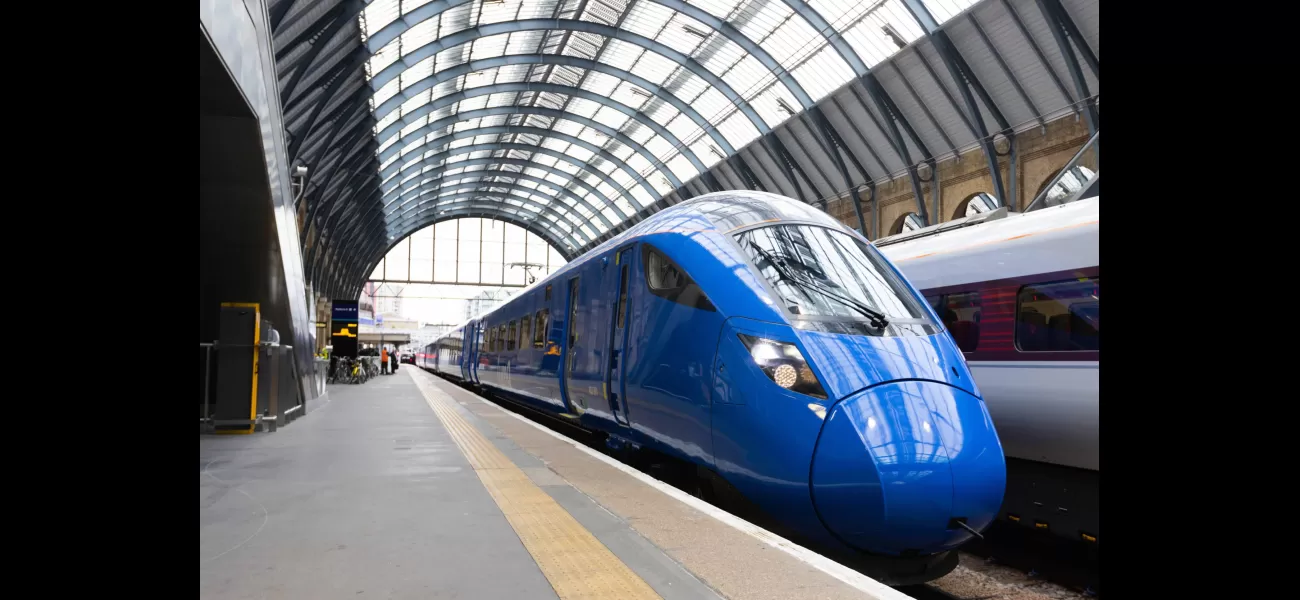UK map displays potential for increased train routes and services.
Rail operators want to increase UK train travel with new plans.
April 15th 2024.

In 2021, Lumo, an open-access rail operator, began its first service between London King's Cross and Edinburgh. This exciting development could mean more options and more frequent trains for millions of people across the UK, as other independent operators also plan to launch new services in different parts of the country.
One of these operators, Grand Union Trains, has proposed direct links between London and cities like Stirling in Scotland and Carmarthen in Wales. This is just one example of how these open-access companies aim to fill gaps in existing timetables and attract more passengers with lower fares. The UK government has shown its support for this trend, believing that it provides customers with more choices and ultimately increases the number of people using rail services.
Rail minister Huw Merriman expressed his enthusiasm, saying, "Open access is such a positive thing." But what exactly is an open-access rail operator? In the UK, most major rail companies are either government-owned or receive management fees from the government. However, open-access operators are different. They set their own fares, take on the full commercial risk, and do not receive any subsidies from taxpayers. Some well-known open-access companies include Lumo, Grand Central, Heathrow Express, Eurostar, and Hull Trains, and there are more on the way.
Supporters of open access argue that it promotes healthy competition among operators, leading to lower fares for customers. However, critics believe that these companies are taking advantage of a "false economy" and that passengers would benefit more if larger operators simplified their timetables. Mr. Merriman also noted that open-access operators have not been affected by recent rail strikes, possibly because of their more modern and collaborative approach to working with employees.
Grand Union Trains is currently considering a potential route between Edinburgh and Cardiff, as there is currently no direct connection between the two capitals. Other companies hoping to become open-access operators include Go-Op, which plans to offer services between Taunton and Weston-super-Mare and Swindon, and Wrexham, Shropshire & Midlands Railway, which wants to establish a route between London Euston and Wrexham. Lumo also has plans to extend its London to Edinburgh service to reach Glasgow, while FirstGroup hopes to launch a similar route between London and Sheffield.
However, not everyone is in favor of open-access operators. Engineer and rail industry writer Gareth Dennis argues that they should not be allowed in the UK because it is already challenging to fit trains into the crowded timetables. He believes that there is no meaningful competition in a saturated rail network like the UK's and that what is needed is a simple and efficient timetable to move large numbers of people. Mr. Dennis also points out that open-access operators can offer lower fares because they use existing depots and hire staff who have already been trained, which he considers a "false economy."
Overall, the rise of open access in the UK has sparked both excitement and debate. These operators offer new opportunities for passengers, but there are also concerns about their impact on the already complex and crowded rail network. Whether or not they will succeed in providing more options and lower fares, only time will tell. As Grand Central's managing director Ian Yeowart puts it, "Whether they survive depends on how good they are and what their customers think."
One of these operators, Grand Union Trains, has proposed direct links between London and cities like Stirling in Scotland and Carmarthen in Wales. This is just one example of how these open-access companies aim to fill gaps in existing timetables and attract more passengers with lower fares. The UK government has shown its support for this trend, believing that it provides customers with more choices and ultimately increases the number of people using rail services.
Rail minister Huw Merriman expressed his enthusiasm, saying, "Open access is such a positive thing." But what exactly is an open-access rail operator? In the UK, most major rail companies are either government-owned or receive management fees from the government. However, open-access operators are different. They set their own fares, take on the full commercial risk, and do not receive any subsidies from taxpayers. Some well-known open-access companies include Lumo, Grand Central, Heathrow Express, Eurostar, and Hull Trains, and there are more on the way.
Supporters of open access argue that it promotes healthy competition among operators, leading to lower fares for customers. However, critics believe that these companies are taking advantage of a "false economy" and that passengers would benefit more if larger operators simplified their timetables. Mr. Merriman also noted that open-access operators have not been affected by recent rail strikes, possibly because of their more modern and collaborative approach to working with employees.
Grand Union Trains is currently considering a potential route between Edinburgh and Cardiff, as there is currently no direct connection between the two capitals. Other companies hoping to become open-access operators include Go-Op, which plans to offer services between Taunton and Weston-super-Mare and Swindon, and Wrexham, Shropshire & Midlands Railway, which wants to establish a route between London Euston and Wrexham. Lumo also has plans to extend its London to Edinburgh service to reach Glasgow, while FirstGroup hopes to launch a similar route between London and Sheffield.
However, not everyone is in favor of open-access operators. Engineer and rail industry writer Gareth Dennis argues that they should not be allowed in the UK because it is already challenging to fit trains into the crowded timetables. He believes that there is no meaningful competition in a saturated rail network like the UK's and that what is needed is a simple and efficient timetable to move large numbers of people. Mr. Dennis also points out that open-access operators can offer lower fares because they use existing depots and hire staff who have already been trained, which he considers a "false economy."
Overall, the rise of open access in the UK has sparked both excitement and debate. These operators offer new opportunities for passengers, but there are also concerns about their impact on the already complex and crowded rail network. Whether or not they will succeed in providing more options and lower fares, only time will tell. As Grand Central's managing director Ian Yeowart puts it, "Whether they survive depends on how good they are and what their customers think."
[This article has been trending online recently and has been generated with AI. Your feed is customized.]
[Generative AI is experimental.]
0
0
Submit Comment





